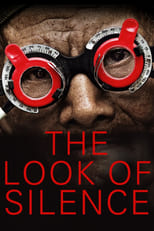Frank Ochieng
Oct 19, 2015
Filmmaker Joshua Oppenheimer was instrumental in delivering one of the most harrowing and heart-breaking documentaries in 2013’s The Act of Killing. As an impressive result of the critically acclaimed documentarian’s gut-wrenching narrative, The Act of Killing deservedly earned an Academy Award nomination for its unsettling truth and revelation. Killing concentrated on the frightening accounts involving the 1965 Indonesian genocide of over one million slaughtered people earmarked with “communist” labeling.
Well Oppenheimer ‘s The Act of Killing astutely offers a charged follow-up to this tremendous tragic tale with the revealing and devastatingly insightful The Look of Silence. The sentimental cynicism is pretty much as unbelievable and incredulous as previously uncovered in Killing. This time, however, Oppenheimer does not focus on the mass destruction of imperiled human beings whose victimization can be traced to the Indonesian government. Instead, he approaches the subject matter on a more personalized, individual level as he emphasizes one specific casualty—the late Ramli Rukun and his family left to ponder the senseless loss of life and love.
The Look of Silence is one of those rare observational sequel -minded documentaries demonstrating a genuine psychological impact despite originally making its familiar mark in the first installment. Anytime the showcasing of jeopardized humanity is profiled it is always an automatic cause to feel enraged and emotionally invested in the outrageous aftermath of the storm. Well Oppenheimer revisits the pain, resentment and frustration in The Look of Silence with convincing empowerment.
In The Look of Silence, Oppenheimer explores the regrets and quiet rage in the aftermath of Ramli’s sadistic murder and gives undivided attention to the deceased victim’s ophthalmologist brother Adi. Adi, not born yet when his brother Ramli suffers at the sinister hands of his executioners five decades ago, undergoes a tactical mission to approach his departed sibling’s tormentors through eye exam visitations. If anything, Adi learns of the pride his brother’s butchers took in claiming his life. More shocking is the fact that these now old-time killers are revered as heroes and have the audacity to live among the common folks whom they probably would have eradicated in their heyday back in the mid 60’s.
Naturally, silence is golden and in spite of the unshakable atrocities perpetrated on the million people that were sacrificed in the name of sanctioned governmental scrutiny it was expected that survivors and other citizens hold their tongues and simply go with the flow. This is why Adi’s unassuming confrontation of Ramli’s killers feels so radical because he dared to face the menacing messengers of evil through the guise of eyesight testing. For Adi to demand the truth and literally and figuratively see through the ruthless eyes of icy murderers that wear their deadly shame with honor is indeed quite unimaginable and challenging.
In questioning the matured monsters’ motivation for silencing the countless sufferers they actually treasured in partaking in the nostalgic nihilism, Adi unravels the murderous mystery while witnessing the twisted joy of reminiscences that these pathetic patients of his puts forth. The question remains: did Adi really accomplish anything in his quest to unearth the horrific stories behind his brother’s demise and that of other unfortunate souls lost in such national man-made destruction? Sadly, there seems to be no remorse or recourse for retaliation concerning the broken hearts of those that perished in such hopelessness.
Oppenheimer does his share of showing some inquisitive fortitude as well. For instance, his interaction with Ramli’s severely aging parents tells of the everlasting bitterness and disgust they still maintain for a country that has turned a blind eye to the historical horror show for which their beloved son paid a hefty price. It does not help the cause that they live in the shadows of such criminal proportions that their unapologetic nation refused to repudiate with political sorrow. Also, Oppenheimer manages to confront Ramli’s actual killers and curiously they revel in glee as they recall fondly the termination of an individual that meant nothing more to them then a routine contracted killing--an eye on the prize if you will.
Absorbingly compelling and contemplative, The Look of Silence proves one thing that the act of repentance is not on any given eye chart of those powerfully ominous societal misfits vehemently refusing to visualize the ugliness of inhumanity even through a redemptive set of fresh new lenses.
THE LOOK OF SILENCE (2015)
Drafthouse Films
Written and Directed by: Joshua Oppenheimer
1 hr. 43 mins.
MPAA Rating: PG-13
Genre: Documentary
Critic’s Rating: ½ stars (out of 4 stars)
--Frank Ochieng
